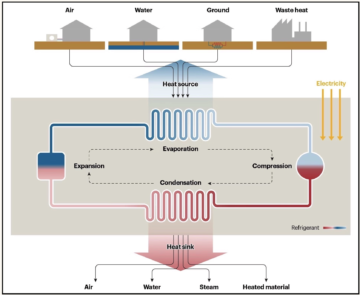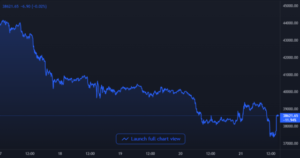
Lactose is a primary, inactive ingredient in some 60 to 70 percent of drugs. It helps form tablets and is used as a diluting powder in certain inhalers. It comes from dairies, of course, which can have big impacts on nature — from water use to greenhouse gas production to fertilizer use and water pollution.
With those nature-based impacts in mind, global pharmaceutical company GSK is evaluating its supply chain and developing a mitigation plan as a participant in a pilot of science-based targets for nature being managed by the Science Based Targets Network (SBTN). GSK is the only drug company, out of 17 companies overall, to participate in the pilot.
Known formerly as GlaxoSmithKline, GSK produces vaccinations for shingles and other infectious diseases, HIV medications, cancer treatments, and drugs and inhalers to treat respiratory diseases from asthma to chronic obstructive pulmonary disease. It has a market cap of $72 billion and was the 10th largest pharma company by revenue in 2022.
SBTN’s voluntary science-based targets for nature, announced in May, provide a framework for companies to evaluate and transparently report their impacts and risks related to natural ecosystems, as well their progress at reducing them.
New sourcing standards focused on nature
As part of the pilot, GSK developed sustainable sourcing standards for key materials, such as lactose, gelatin, palm oil, paper and sugar. Some of these materials are used in the drugs and inhalers produced by the company, like lactose. Others are used as “adjuvants,” in vaccines to help create a stronger immune response in people receiving the vaccine. Still others are used for packaging or in drug testing.
GSK’s sustainable sourcing standards cover impacts including land-use change, water stewardship, biodiversity, animal welfare, hazardous materials, greenhouse gas emissions, labor rights and impacts on local communities. They are intended to help suppliers assess, improve and verify their approach to mitigating their impacts and will be refined with feedback GSK receives during the pilot.
GSK is the front-runner [in setting nature and biodiversity standards] in the pharmaceutical industry, and meeting all those standards will not be a walk in the park,
GSK looked to existing sustainability certification schemes to develop its guidelines, said Lisa Martin, chief procurement officer at GSK. But it first went through a process of identifying and prioritizing materials that have nature and climate impacts by reviewing its entire bill of materials. GSK referred to the SBTN’s list of high impact commodities (automatic PDF download) to identify its priority materials. The company then segmented its priority materials into categories such as crop, marine and livestock, and hired different subject matter expert firms to map the supply chains for a subset of those commodities .
For the pilot, GSK selected a handful of materials with differing supply chain complexity including the supplier size and supplier maturity, in terms of their attention to climate and nature impacts.
“You can’t focus on everything or you won’t get anything done,” Martin said.
GSK chose materials with distinct supply chain complexities to test whether its standards and overall sustainable sourcing program could be implemented across a broad range of supply chain contexts.
The impact on GSK suppliers
The company is engaging with suppliers of lactose and a few other materials to gather information for the SBTN pilot and develop its mitigation plan. DFE Pharma is one such supplier.
Based in Germany, DFE Pharma is a major producer of pharmaceutical-grade lactose. The company buys milk from dairy cooperatives, which source milk from individual dairy producers.
GSK issued “a very long list of different standards and requirements,” covering more than 100 areas of biodiversity and social concerns, DFE CEO Martii Hedman told GreenBiz.
“Their standards are very demanding. They are the front-runner [in setting nature and biodiversity standards] in the pharmaceutical industry, and meeting all those standards will not be a walk in the park,” he said.
DFE is doing a gap analysis to identify where it is falling short against the criteria. “I don’t think we yet meet all the requirements, Hedman said, “but based on our initial analysis, there is no reason why we will not be able to get there.”
Like GSK, DFE Pharma is mapping its supply chain, and while it has “a pretty clear idea” of what the targets will be for its own suppliers … “we still need some time to define exactly the [key performance indicators],” Hedman said. The focus, however, will be on collaborating with its suppliers to help them reduce fertilizer use, develop animal feed in ways that produce less emissions or deploy green energy systems on farms, he said.
DFE Pharma already has robust sustainability goals for its own operations, for which it was awarded a silver rating by EcoVadis, a global business sustainability rating company. But SBTN’s science-based targets for nature are accelerating its action, especially on addressing Scope 3 emissions, Hedman said. “It helps us to raise the bar.”
Part of a broader strategy
While GSK is just beginning to get a handle on its nature-based impacts, it has already gone through a similar exercise to identify climate risks in its supply chain, identifying its top 30 ingredients associated with major climate impacts and its top 30 suppliers of those ingredients.
One mitigating action it developed out of that assessment is an initiative called Energize. Launched with 10 other pharmaceutical companies, Energize works with a third party, Schneider Electric, to help pharmaceutical suppliers procure renewable electricity through buying cohorts.
“The more they can impact their own footprints, the more it helps all our Scope 3,” Martin said, adding, “We may compete in the marketplace for our medicines and vaccines, but in Energize, we’re sharing what we can do.”
Julie Nash, senior program director, food and forests at Ceres, said, “It’s great that GSK is getting out ahead” by participating in the SBTN pilot.
Investors will be looking for a detailed level of transparency on science-based targets for nature, she added. “Not only that companies have created a target and have done the assessment, but what are the results of that assessment?” Companies will also need to develop a plan for assuring that their suppliers adhere to standards, she said.
GSK will audit suppliers, Martin said, so that “we can learn and understand better where the gaps are, and then develop co-solutions to improve that supply chain. We need to be able to work in a very collaborative way with these third-party suppliers.”
GSK’s current target is to ensure 100 percent of its agricultural-, forestry- and marine-derived materials are “sustainably sourced” and deforestation-free by 2030.
“Strategically and philosophically, we understand the impact of climate change and nature, on people’s health,” Martin said.
Results from the SBTN pilot will be released in late 2023 or early 2024, and more companies will be able to submit targets for review in 2024.
- SEO Powered Content & PR Distribution. Get Amplified Today.
- PlatoData.Network Vertical Generative Ai. Empower Yourself. Access Here.
- PlatoAiStream. Web3 Intelligence. Knowledge Amplified. Access Here.
- PlatoESG. Automotive / EVs, Carbon, CleanTech, Energy, Environment, Solar, Waste Management. Access Here.
- BlockOffsets. Modernizing Environmental Offset Ownership. Access Here.
- Source: https://www.greenbiz.com/article/how-global-pharma-gsk-rewriting-supplier-rules-protect-biodiversity
- :has
- :is
- :not
- :where
- 10
- 100
- 17
- 17 companies
- 2022
- 2023
- 2024
- 2030
- 30
- 8
- a
- Able
- accelerating
- across
- Action
- added
- adding
- addressing
- adhere
- against
- ahead
- All
- already
- also
- an
- analysis
- and
- animal
- announced
- anything
- approach
- ARE
- areas
- AS
- assess
- assessment
- associated
- At
- attention
- audit
- Automatic
- awarded
- bar
- based
- BE
- Beginning
- being
- Better
- Big
- Bill
- Billion
- broad
- broader
- business
- but
- Buying
- Buys
- by
- called
- CAN
- Cancer
- cap
- categories
- ceo
- certain
- Certification
- chain
- chains
- change
- chief
- chose
- clear
- Climate
- Climate change
- collaborating
- collaborative
- comes
- Commodities
- Communities
- Companies
- company
- compete
- complexities
- complexity
- Concerns
- contexts
- could
- course
- cover
- covering
- create
- created
- criteria
- crop
- Current
- dairy
- define
- demanding
- deploy
- detailed
- develop
- developed
- developing
- different
- differing
- Director
- Disease
- diseases
- distinct
- do
- doing
- done
- Dont
- download
- drug
- drug testing
- Drugs
- during
- Early
- Ecosystems
- Electric
- electricity
- Emissions
- energy
- engaging
- ensure
- Entire
- especially
- Ether (ETH)
- evaluate
- evaluating
- everything
- exactly
- Exercise
- existing
- expert
- Falling
- falling short
- Farms
- feedback
- fertilizer
- few
- firms
- First
- Focus
- focused
- food
- For
- form
- formerly
- Framework
- from
- gap
- gaps
- GAS
- gather
- Germany
- get
- getting
- Global
- global business
- Goals
- gone
- great
- Green
- green energy
- greenhouse gas
- Greenhouse gas emissions
- guidelines
- handful
- handle
- Have
- he
- Health
- help
- helps
- HIV
- How
- However
- HTTPS
- i
- idea
- identify
- identifying
- immune
- Impact
- Impacts
- implemented
- improve
- in
- inactive
- Including
- Indicators
- individual
- industry
- Infectious diseases
- information
- ingredients
- initial
- Initiative
- intended
- into
- Issued
- IT
- ITS
- jpg
- just
- Key
- labor
- largest
- Late
- launched
- LEARN
- less
- Level
- like
- List
- local
- Long
- looked
- looking
- major
- managed
- map
- mapping
- Marine
- Market
- Market Cap
- marketplace
- Martin
- materials
- Matter
- maturity
- May..
- Meet
- meeting
- Milk
- mind
- mitigating
- mitigation
- more
- Natural
- Nature
- Need
- network
- no
- of
- Officer
- Oil
- on
- ONE
- only
- Operations
- or
- Other
- Others
- our
- out
- overall
- own
- packaging
- palm
- Paper
- Park
- part
- participate
- participating
- party
- People
- percent
- performance
- Pharma
- Pharmaceutical
- philosophically
- pilot
- plan
- plato
- Plato Data Intelligence
- PlatoData
- Pollution
- pretty
- primary
- prioritizing
- priority
- process
- procurement
- produce
- Produced
- producer
- Producers
- produces
- Production
- Program
- Progress
- protect
- provide
- raise
- range
- rating
- RE
- reason
- receives
- receiving
- reduce
- reducing
- referred
- refined
- related
- released
- Renewable
- report
- Requirements
- Respiratory Diseases
- response
- Results
- revenue
- review
- reviewing
- rewriting
- rights
- risks
- robust
- rules
- s
- Said
- schemes
- Schneider Electric
- Science
- scope
- selected
- senior
- setting
- sharing
- she
- Short
- Silver
- similar
- Size
- So
- Social
- some
- Source
- sourced
- Sourcing
- standards
- Stewardship
- Still
- Strategically
- stronger
- subject
- submit
- such
- sugar
- suppliers
- supply
- supply chain
- Supply Chain Complexity
- Supply chains
- Sustainability
- sustainable
- sustainably
- Systems
- T
- Target
- targets
- terms
- test
- Testing
- than
- that
- The
- their
- Them
- then
- There.
- These
- they
- Think
- Third
- third-party
- those
- Through
- time
- to
- top
- Transparency
- transparently
- treat
- treatments
- understand
- us
- use
- used
- Vaccine
- vaccines
- verify
- very
- voluntary
- was
- Water
- Way..
- ways
- we
- Welfare
- WELL
- went
- What
- whether
- which
- while
- why
- will
- with
- Won
- Work
- works
- yet
- you
- zephyrnet









